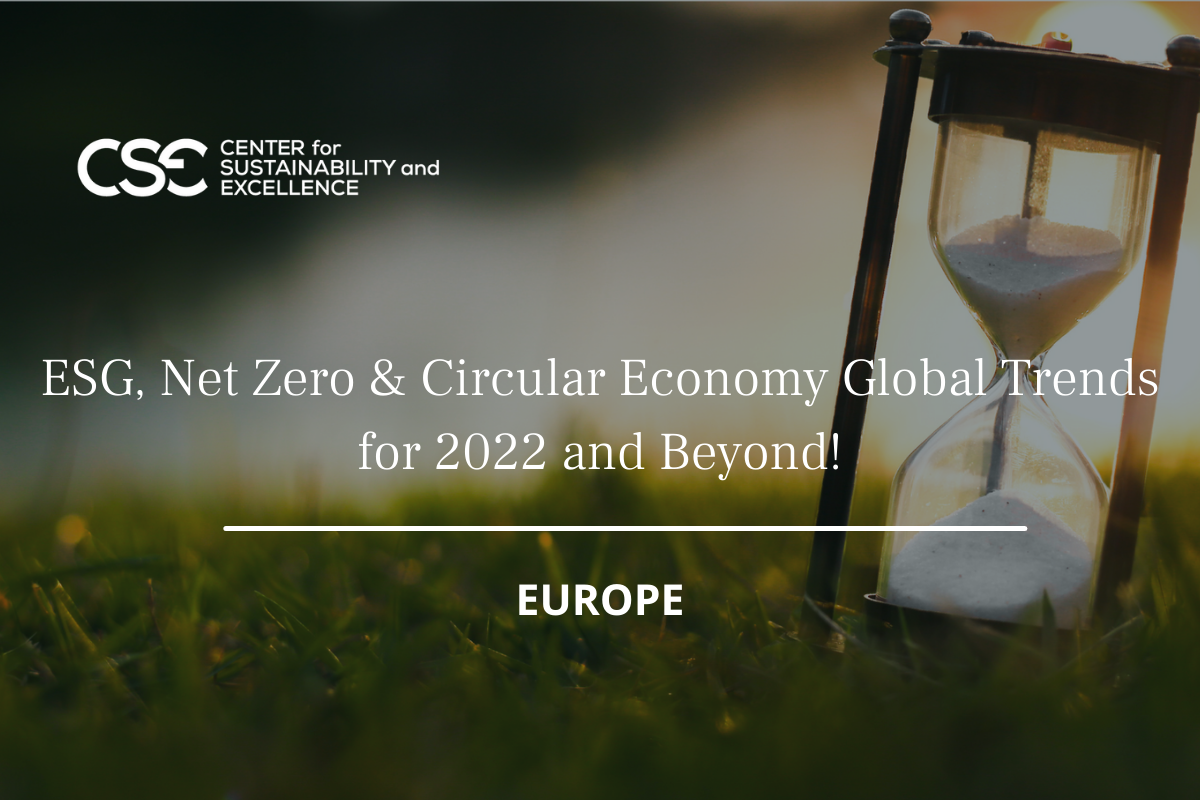ESG, Net Zero & Circular Economy Global Trends for 2022 and Beyond!
By CSE research team
- EU Green Deal – What’s Next
The EU is working on revising its climate, energy and transportation legislation under the “Fit for 55” package in order to align all the current legislation with the 2030 and 2050 goals of the EU Green Deal. This package will cover areas such as renewables, energy efficiency, building, land use, and emissions trading schemes, and will include revisions of existing legislation (such as the energy taxation directive and the CO2 emissions for cars and vans), as well as proposals for new legislations (such as the EU Forest Strategy and the ReFuelEUAviation).
- Net Zero Emissions
Zero emissions will not only relate to reducing carbon in the atmosphere, but also to a wider transformation of the business model. Already, one fifth of the largest 2000 public traded companies have been committed to net zero targets. In 2022, we expect to see companies’ net zero pledges to be put to the test, since advances in regulations will force them to walk the talk. Already Amazon has admitted that ‘’they do not know exactly how they will go there’’. The fact that many companies don’t fully count their Scope 3 emissions, or they use questionable measuring methodologies, led to the growth of the Science-based Targets initiative, with the aim to set concrete emissions reduction goals. Under the Science-based Targets standards, the majority of companies will require high levels of decarbonization (90-95%) in order to reach net-zero.
- Incorporating Circular Economy and ambitious ESG goals
In 2022 we expect to see every company to look at ways to become more efficient, by taking a closer look at how they manage waste, to ensure product durability and repairability, explore the market of refurbished products, and to study if and how they can implement a take-back or recycling program. This will include taking a close and deep look into the supply chain to know exactly who their suppliers are and communicate to the consumers who their suppliers are. This will lead to the need for advanced tools that will incorporate artificial intelligence, which will allow monitoring of supplier ESG and sustainability information, leading to informed decisions about each supplier. However, setting out ambitious ESG goals requires corporate leadership, sophisticated ESG strategies and skillsets for delivering the anticipated results.
- Increased focus on the S (social) of ESG
Over the last 2 years, the COVID-19 pandemic has brought social issues back at the top of the agenda, while at the same time it has revealed significant systemic issues. Schroders’ 2021 Global Investor Study found that more than 57% of investors globally said that social issues had become more important to them during the pandemic. In the past, the lack of measurable impacts and results in the social pillar has led the spotlight on the environmental issues. What is obvious today is that considering social risks can made a difference in improving financial resilience. Investors will be expected to be taking a closer look in diversity, inclusion, and in all the current social issues.
- Improved ESG Data and creation of ambitious goals
Regulatory authorities around the world face significant challenges due to lack of clear definitions and standardized procedures. In Europe, the Sustainable Finance Disclosure Regulation (SFDR) enforced mandatory ESG disclosures, while the EU Taxonomy includes a list of environmentally sustainable financial activities. The need for credible and widely accepted standards for disclosing and reporting information will continue to grow in 2022. The role of ESG information will also continue to grow, as their influence on sustainability valuations, overview, and risk assessment will be strengthened. This means that not only the quantity of ESG information will grow, but also the quality, since more and more investment and funding decisions are based on ESG information. Continued ESG training of C-Suite Executives is critical for maintaining tangible results and credible communication of progress on ESG matters.
- Measuring Biodiversity Impacts
Despite past efforts, the rate of biodiversity loss is constantly increasing. It is now obvious that the impacts to our way of life and global economies are equally important to those of climate change. Mandatory reporting on impacts on biodiversity is still rare, but some countries, including UK, are demanding from companies to report the annual corporate biodiversity footprint and investors to take it under consideration. Additionally, the EU directive SFDR already requires from investment companies to disclose their activities that negatively affect sensitive biodiversity areas.
- Generation Z Sustainable Life Style
Consumers will continue to push for more sustainable products as Gen Z is gaining more purchasing power as they join the workforce. There are three main product categories that will become even more sustainable: food, fashion, and lifestyle products. Regarding food products, consumers look for improved solutions when it comes to production (food production accounts for 26% of greenhouse gas emission), sustainable packaging (or less packaging), and a renewed preference to local products. Fashion is already exploring circularity solutions for the materials used in products, and a further boost is expected in 2022. Finally, lifestyle changes are evident in the switch to electric vehicles and digitalization of services.
- Greenwashing Scrutiny
In 2022, the term greenwashing will become more popular, as the need for companies to demonstrate real action and be more transparent is growing. Consumer groups and regulators (e.g EU taxonomy legislation) will exercise more pressure for transparency and organizations will be forced to move beyond traditional green marketing and PR towards meaningful actions.
CSE is a leading boutique firm operating globally that specializes in maximizing business impact in Sustainability ESG and Corporate Responsibility. CSE helps professionals advance their careers through our certified live digital (GRI and Certified Sustainability ESG Practitioner Program), online (www.Sustainability-Academy.org) and group training services globally and supports companies and organizations grow and excel through Sustainability ESG consulting and coaching.
Reach us at [email protected] for more information







